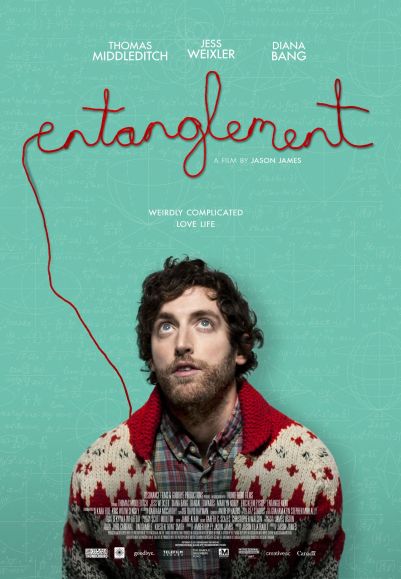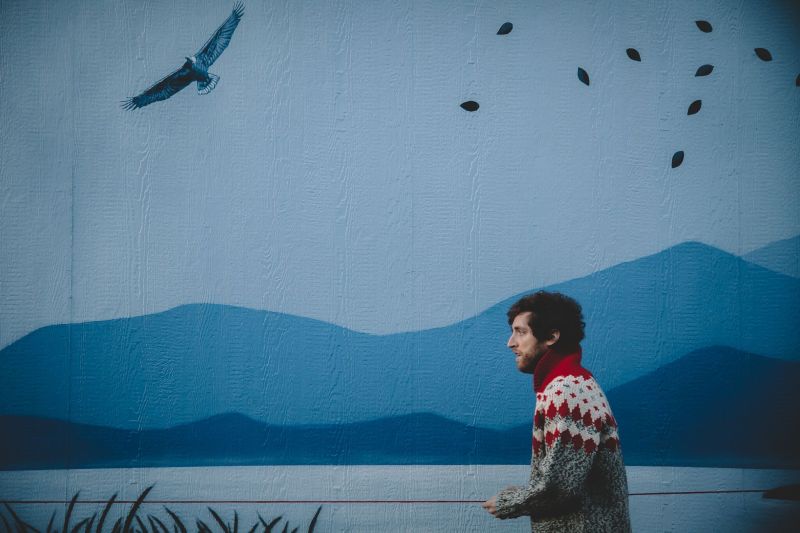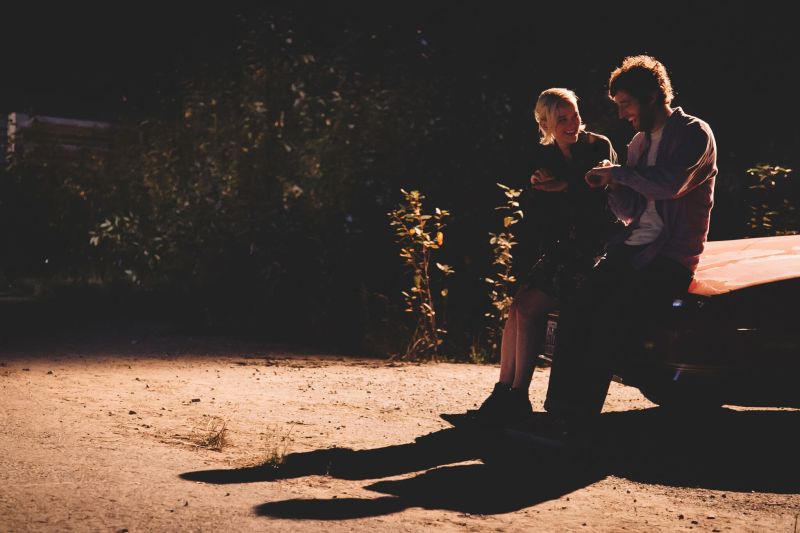An Interview with Jason James
By Holly McKenzie-Sutter
This film is part of the annual #mustseeBC filmmaker showcase presented by STORYHIVE, now open until September 28th. Visit mustseebc.viff.org/ for more details and to vote for Entanglement. Jason James calls Entanglement, his latest feature film, a “magical realist romantic comedy” that’s also “kind of a comedy about depression.” That might seem like a difficult tonal tight-rope to walk, but the material is in capable hands with James, the Vancouver-based producer and director whose stories thrive in the messy, uncomfortable spaces of everyday life—James’ first directed feature, That Burning Feeling, followed a man coming to terms with an STI diagnosis.
Jason James calls Entanglement, his latest feature film, a “magical realist romantic comedy” that’s also “kind of a comedy about depression.” That might seem like a difficult tonal tight-rope to walk, but the material is in capable hands with James, the Vancouver-based producer and director whose stories thrive in the messy, uncomfortable spaces of everyday life—James’ first directed feature, That Burning Feeling, followed a man coming to terms with an STI diagnosis.
Entanglement stars Thomas Middleditch as Ben, a recently divorced Vancouverite struggling with mental illness and depression, whose relationship with his dream woman starts to unravel as his imagination slowly fuses with reality. The film looks at identity, family, and the threads that tie all of us together in an unconventional comedy about mental illness, love, and a little bit of quantum physics. I talked to Jason James about developing the film, shooting in Vancouver, and finding humour in taboo topics.
Holly McKenzie-Sutter: How did you come across this screenplay and what made you interested in directing it?
Jason James: I was developing a project with Kristen Smith, who wrote The House Bunny and The Ugly Truth. We were looking for a Canadian writer and she had mentioned Jason Filiatrault, and she was like, “You have to meet this guy, he’s a great writer,” and he is. We all started developing something together and it never went  anywhere, and then out of the blue, Jason just sent me a first draft of this script, and it was just so emotional and fragile and funny and dark and weird, and I was like, “I have to make this movie, I just love it so much.” I remember reading the script and I created a Tumblr site right away of images, videos, music, how I wanted the film to look and feel, and I sent it to him. I’ve never pitched a writer so hard to let me direct their movie. I flew to Calgary, I took him out for dinner, and finally arm-wrestled him into letting me make the movie with him. So my company optioned it and we developed it for two years, working on the script, and that script won like, every development grant and award we applied to.
anywhere, and then out of the blue, Jason just sent me a first draft of this script, and it was just so emotional and fragile and funny and dark and weird, and I was like, “I have to make this movie, I just love it so much.” I remember reading the script and I created a Tumblr site right away of images, videos, music, how I wanted the film to look and feel, and I sent it to him. I’ve never pitched a writer so hard to let me direct their movie. I flew to Calgary, I took him out for dinner, and finally arm-wrestled him into letting me make the movie with him. So my company optioned it and we developed it for two years, working on the script, and that script won like, every development grant and award we applied to.
At the heart of it, it was just a really beautiful, emotional, fragile, weird movie that I knew I wanted to be a part of. There are a lot of interesting themes and ideas there. But for me as a director, when I read a script, I think a lot about point of view and perspective, and the movie is so much from this guy’s perspective and his perspective, because of his mental illness and health issues, is sort of skewed. As a director, to come into a project that’s so visual and so visceral, and to talk about mental health and mental illness not from an outside perspective but from an inside perspective, and how it’s weirdly beautiful and poetic and romantic in a certain way, that really excited me. The visual storytelling elements, as director, really got me excited.
McKenzie-Sutter: How did you incorporate your vision of what Ben’s fantasy was going to look like?
James: Well, immediately, when I was pitching Jason on letting me work on his script, a “vinyl aesthetic” was something I was pitching to him. I really wanted it to feel kind of handmade, and slightly frayed, slightly decaying in a way. And that was kind of my whole aesthetic for the film, was how can I make it feel sort of handmade, and authentic and real and slightly off-kilter.
What was interesting is there are a lot of visual effects in this movie. I’ve never made a film with visual effects before, really, and Vancouver is lousy with visual effects, sci-fi shit. I’d go around and have meetings with all these companies, and you know, their job is to make the unreal real, and I wanted the unreal to feel unnatural. I wanted it to bump against reality, I wanted the visual effects to feel awkward and handmade. So when you see the fireworks in the sky, they’re really crappy, weird laser-y ones, when you see the deer that are these weird, claymation, animated deer. I really wanted it to feel like all of the things are coming from Ben’s head.
McKenzie-Sutter: The movie is funny, but it’s also very emotional and intense. Your previous feature That Burning Feeling is a story about STIs. Both films deal with taboo, awkward topics that people don’t want to talk about. What draws you to those kind of stories?
James: I want to make movies that are about real moments and real people and real situations. I don’t want to make a just movie that’s like another movie, I want to make something that’s a little bit different or weird or odd, that’s going to make you stop and take notice. How can you take these really difficult subject matters like STIs or mental illness and make them beautiful or funny or strange and relatable?
And so, you know, everyone’s always like, “Is your film a drama or comedy?” and I’m sort of like, life is not drama or comedy, it’s drama and comedy. And to me, that’s more honest, it’s more real. It’s more like Billy Wilder’s films, you know, if you watch The Apartment, Kiss Me Stupid, Some Like It Hot, it’s like this really funny, kind of comedic setup. But underneath there’s some really dramatic, dark undertones, and that to me is more like real life and it’s what excites me about telling stories and about filmmaking- the grey area between all of that.
McKenzie-Sutter: How did you go about casting the movie?
James: When I’m casting films I like to look at interviews with actors, just to see who they are innately as people, you know, how intelligent they are, how well spoken they are, how they interact with other people in a non-scripted way. That fascinates me. And then, how does that relate to this character that we’re trying to bring to life?
Thomas Middleditch, obviously he’s very well known from Silicon Valley, I just watched a lot of interviews with him. And I remember he was at the Sundance Film Festival with a movie called The Bronze, and the interviewer asked him some inane question like “What’s your favourite song?” He started talking about Neutral Milk Hotel’s “The King of Carrot Flowers” and just started bawling. He just started crying in this totally conventional interview, and I was like “Holy shit, that’s this guy who is so fragile, just so on the edge that he’s about to break up and laugh or break down and cry.” And I was like, “That’s the guy.”
You know, the movies I’m making, they need to have movie stars in order to be financed. I can’t just cast whoever I want, but he was the perfect guy for the role, the first guy that I sent the script to, and he got the movie made based on his interest, and him and I talking about the script and the material, and the rest of the cast came in around him.
McKenzie-Sutter: One criticism of mainstream comedies is that the casts are often not particularly diverse, but I’ve noticed that’s not the case in your movies, with prominent roles by John Cho in That Burning Feeling and Diana Bang in Entanglement. Is diversifying the cast an objective for you when you set out to make movies?
James: I think to me, the best actor wins. John Cho’s character in That Burning Feeling, his character was written as Roger Whitacre. My friend Viv [Leacock], who plays the doctor in Entanglement, the black dude, his name in the movie is Dr. Chang. So, the writer can write whatever they want, but I’m going to cast who I like and who I think is right for the role. And I do think the world is diverse. Again, I don’t want to say it’s some big political statement, but it’s just about creating an honest, real world that is believable and feels grounded and realistic, so that’s what I try to do.
McKenzie-Sutter: You filmed Entanglement in Vancouver but it kind of feels like it could take place anywhere. What aspects of you being Canadian, and using Vancouver as a setting, make this a Canadian film?
James: I’m from Vancouver, I feel like all of my ideas and inspiration are kind of a product of this place. It’s kind of a weird, funny, odd place. I mean, That Burning Feeling is about sex and dating and real estate, which is like, very Vancouver. This movie, Entanglement, is less of an external film and more of an internal kind of struggle, so I was less interested in place with this film. I was more interested in honestly just really grounded, real performances, and the emotions of this movie. I wasn’t really concerned with where I shot it, or where we set the movie. But I feel that I am very Canadian and I love making movies here, I’ve had so many opportunities, and it’s a big part of who I am as a filmmaker, for sure.
McKenzie-Sutter: What are some particular challenges that come up when filming in Vancouver as opposed to the States?
James: Oh man, there’s a lot. I’ve made all my films in Canada, but all my films have a bit of American money or American talent. I’ve lived in the states, but I shoot all my films in Vancouver. The reason why is that I think we have amazing crews, we have amazing locations. I live here, I know it really well, and I love shooting films here. The challenge is that it’s the middle of nowhere, you know, it’s not Toronto, it’s not L.A., it’s not New York, so to try and entice famous movie stars to leave the comforts of Hollywood to come to Vancouver or to Toronto or whatever, it’s difficult.
Canadian films haven’t always had a great rep on the international scale, so it’s hard to get people excited about Canadian film. And I’m really trying to make Canadian films that are interesting, character-driven comedies that have something to say about the world, but that are also commercial and that will travel. That’s really what I’m trying to do.
McKenzie-Sutter: You’ve shown this film at a few festivals already. What has the response from audiences been like?
James: It’s been cool. I mean, the film deals with mental illness, loneliness, depression, and what’s amazing when you show this film is how many people relate to it. It just really surprised me how many people have been touched by mental illness, either as a friend or a family member or themselves, and how dark and scary that can get, and just how prevalent it is. I obviously know that it’s out there, but I didn’t realize how prevalent it is, and I think this movie is kind of like a gateway where people feel like they can open up and talk about it a little bit, and that’s cool.
Entanglement is screening at the Vancouver International Film Festival as part of the SEA TO SKY program stream on Saturday, September 30 and again Saturday, October 7. Tickets available here.
